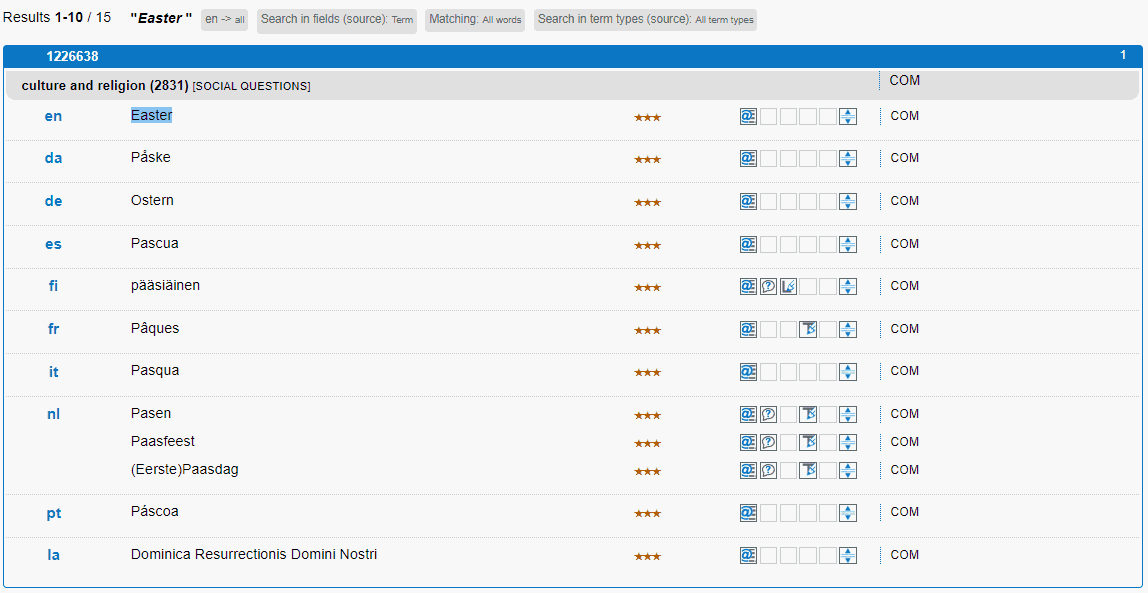Some of us may not have that impression yet, but Easter holidays are here! Colourful eggs, chocolate bunnies, Easter baskets, and various interesting games are being prepared in homes around the world. Have you ever wondered how did Easter get its name? Read on as our IATE Term of the Week is dedicated to this biggest Christian holiday!
Easter | Word Origin
The word Easter pulls its roots from the Old English ēastre; of German origin and related to German Ostern and east; perhaps from Ēastre – the name of a goddess who was associated with fertility and spring, and whose feast was celebrated at the spring equinox. Additional terms related to Easter traditions have been attested over time: Easter egg by 1825, Easter bunny by 1904 and Easter rabbit by 1888. Today, these are widely used terms especially among families with younger children.

The earliest recorded observance of Easter celebration happened in the 2nd century, though Jesus’ Resurrection commemoration (which is the holiday’s principal aim) probably occurred earlier. Today, the observation date varies depending on the churches but most Christians celebrate it on the first Sunday following the first full moon after the spring equinox, following the Council of Nicaea’s proposition (April 12th in 2020).
Easter Traditions around the World
- In old times, Christians were required to fast for 40 days (excluding Sundays), and this period was called Lent. The Easter feast that would then follow gave the whole celebration a more important note. Nowadays, it’s more common that people give up on an indulgence (e.g. chocolate, snacks, social media, alcohol). The exact Lent end date varies depending on which practice the church is following (Western or Eastern), but it usually ends near Easter day.
- Nothing says “Easter” more than eggs! Whether coloured or chocolate ones, Easter eggs are certainly part of the Easter basket and table’s inventory list. Even ancient cultures saw eggs as signs of fertility and new life, and used them in various religious and pagan rituals. In early years, Christian community members used to dye eggs based on the meaning each colour had: yellow for resurrection and blue for love, for example. Today, egg colouring is part of family traditions and people around the world come up with incredibly creative ideas for their decoration.
- A tradition that dates back to pagans is that of the Easter bunny. They celebrated Eastre – the goddess of fertility, a trait that rabbits are most famous for. Over the years, chocolate Easter bunnies became a popular and well-known addition to Easter treats.
- Ever heard of Hot Cross Buns? If not – make sure to check our I·ATE Food Term of the Week as we’re bringing you a recipe you can try at the comfort of your home! These delicious round breads marked with a cross have been baked all the way back since ancient Egypt, Rome and Greece. They later became a popular Easter tradition, and many English believed that if hot cross buns were baked on Good Friday, they would never grow mouldy. We’re not sure about you, but with us they rarely last long enough for that anyway 😊
Easter holidays are a good period to spend some creative time together with your nearest ones; especially during isolation times it’s good to continue family traditions as in the past years. TermCoord wishes you all a Happy Easter!
Sources
Britannica. 2020. Easter | Origin, Names, Facts, & Dates | Britannica. [ONLINE] Available at: https://www.britannica.com/topic/Easter-holiday. [Accessed 6 April 2020].
Britannica. 2019. First Council of Nicaea | Britannica. [ONLINE] Available at: https://www.britannica.com/event/First-Council-of-Nicaea-325. [Accessed 6 April 2020].
Online Etymology Dictionary. 2020. Easter | Origin and meaning of the name easter by Online Etymology Dictionary. [ONLINE] Available at: https://www.etymonline.com/word/easter. [Accessed 6 April 2020].
Good Housekeeping. 2020. History of Easter Traditions Around the World – Why We Celebrate Easter. [ONLINE] Available at: https://www.goodhousekeeping.com/holidays/easter-ideas/g191/history-easter-traditions/. [Accessed 7 April 2020].
Lexico powered by Oxford. 2020. Easter | Definition of Easter by Lexico. [ONLINE] Available at: https://www.lexico.com/en/definition/easter. [Accessed 6 April 2020].
Mental Floss. 2018. The Origins of 11 Easter Traditions | Mental Floss. [ONLINE] Available at: https://www.mentalfloss.com/article/94189/origins-11-easter-traditions. [Accessed 7 April 2020].
Lara Karlović
 Written by Lara Karlović, a digital marketing enthusiast with experience in social media management, SEO content writing and optimization and content marketing.
Written by Lara Karlović, a digital marketing enthusiast with experience in social media management, SEO content writing and optimization and content marketing.

